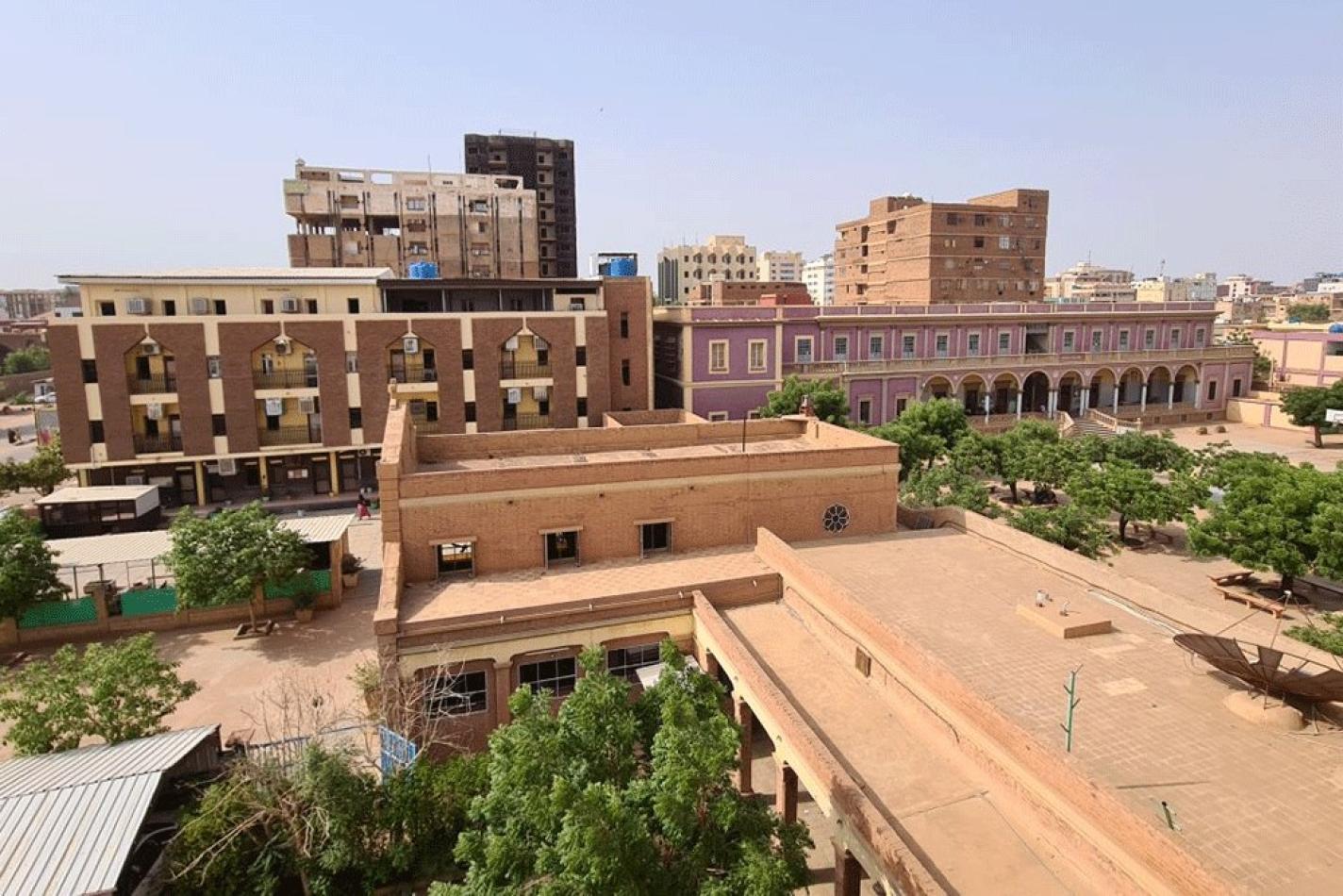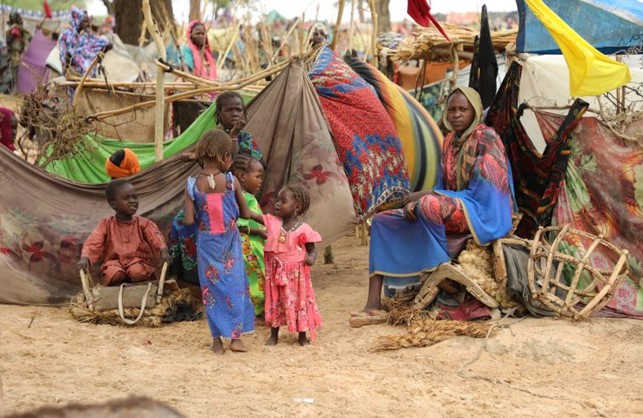Daniel Comboni
Comboni Missionaries
Institutional area
Other links
Newsletter
Saturday, March 29, 2025
On 26th March, after long weeks of siege and having liberated almost the entire city of Omdurman in late 2024 and Khartoum North in January of this year, the regular army reports another major victory against the Rapid Support Forces (RSF) and enters the centre of Khartoum, where the cathedral and many of our oldest Combonian missions, including Comboni College [in the picture], are located.
As the army enters Khartoum, we hear reports that the RSF are moving westwards, into Darfur. Videos and photos are starting to circulate on social media, showing the destruction and chaos left behind by almost two years of war. For us missionaries, it is a consolation to see that the buildings we had abandoned are still standing – which is no small thing, in fact. The images we have received tell us that Khartoum is waiting for us. The bricks will be put back together – it will be hard work. But much harder will be the task of healing the souls (and bodies) of the survivors. Said Comboni: “Sudan or death!”
The forgotten war in Sudan, which broke out almost two years ago between the Rapid Support Forces (RSF) and the Sudanese Army (SAF), has caused one of the worst humanitarian crises in the world, plagued by horrendous violence: tens of thousands of deaths, 12 million displaced people, more than 24.6 million people facing severe food insecurity, hospitals and health facilities destroyed, and over 17 million children without schools. SIR interviewed Comboni Father Angelo Giorgetti.
The Sudanese army and allied armed groups recaptured the presidential palace, the central bank and other strategic buildings in the capital, Khartoum, from the paramilitary Rapid Support Forces (RSF) a few days ago. Two years into the war, “I think it’s premature to talk about a normalisation of the situation”, Father Angelo Giorgetti, General Treasurer of the Comboni Missionaries and Provincial of Sudan from 2003 to 2019, said in a conversation with SIR. The forgotten war in Sudan has caused one of the worst humanitarian crises in the world, plagued by horrendous violence: tens of thousands of deaths, 12 million displaced people, more than 24.6 million people facing severe food insecurity, hospitals and health facilities destroyed, and over 17 million children without schools.
The Comboni Missionaries were compelled to abandon the school and the religious homes they ran in Khartoum and El Obeid, in Kordofan. A small number of missionaries remained in Port Sudan and Kosti, located on the White Nile in the direction of South Sudan. The conflict erupted on 15 April 2023, precipitated by the failure of negotiations aimed at integrating the RSF into the regular army.
This failure led to a power struggle between the army chief, Abdel Fattah al-Burhan, and his former deputy, Mohamed Hamdan Dagalo, who now heads the RSF, successors to the notorious Janjaweed militias known for their ferocity during the previous Darfur war. The country is currently divided in two, with the army controlling the east and north, and the RSF controlling almost all of western Darfur and parts of the south. In recent days, a population of almost 15,000 families has been forcibly displaced from their homes in the northern town of Al-Malha.
As soon as the presidential palace in Khartoum was recaptured by the Sudanese army, the RSF launched drones, killing three journalists and several military personnel. “It’s difficult to determine their military capacity”, comments Father Giorgetti. “This is important because it means that the Sudanese army has made progress, but more information is needed. Whether this last development is a breakthrough is hard to say.” Certainly, he continues, “if the army succeeds in retaking Khartoum, many people will be keen to return and resume their various activities. If the daily combat in the city were to stop, it would be a tremendous relief.” Khartoum was home to 6-7 million inhabitants. At least 3.5 million have been displaced. “Let us hope that they will eventually return to their homes, even if these homes are partially destroyed.”
Sudan faces a dire humanitarian emergency. “A large part of the population has been deprived of any means of subsistence through informal trade or agriculture over the past year,” he says. “They are suffering from severe food shortages. Hospitals are not operational. Millions of displaced people face extremely precarious living conditions.” Famine is widespread in North Darfur. According to the UN, it is projected to spread to five more areas, including the capital, by May. More than 770,000 children are estimated to suffer from severe acute malnutrition this year.
The ongoing conflict in Sudan is not the subject of interest or discussion, but it has important implications. Only Pope Francis mentions it in his speeches, including from the hospital. “The conflict has a serious impact because it destabilises a very large area that affects migratory movements, the Red Sea, the Suez Canal.”
As far as I know, access to journalists is almost impossible in these places. The scarcity of humanitarian organisations operating in these regions is further compounded by the challenging conditions they have to face”, said the Comboni Priest.
The conflict is rooted in numerous factors. Following the ousting of the 30-year dictator Omar Al Bashir in 2019, a popular uprising erupted, demanding the election of a civilian government, “but this decision was constantly postponed,” recalls Fr. Giorgetti. “A transition period ensued, with a government that included the military and the RSF. However, a rift soon emerged between the two groups, leading to the current state of affairs. Civil society was powerless in the face of armed violence”. The civil movement had initially succeeded in halting the armed conflict between the various tribal groups and had reached a consensus on a solution. Unfortunately, now each group is back on its own, there was no unifying project. I have no idea how this will be resolved.”
The international interests behind the conflict are hard to trace. “There are obviously foreign interests involved, and someone is definitely profiting from the conflict, because there are so many weapons coming in,” says the missionary. “Whoever is supplying the weapons will obviously want something in return. However, identifying the actors operating in the background behind the warring factions is a complex task. Not surprisingly, the warring parties are looking for international alliances to garner support. However, when interests are at stake, things can change very quickly: one must be wary of clichés, because alliances are never stable and there are many interest groups in the states.” The only certainty in the present moment is the hundreds of thousands of people at risk of starvation, not least because the flow of humanitarian aid is being impeded.
Patrizia Caiffa – SIR





